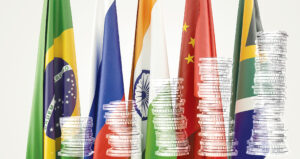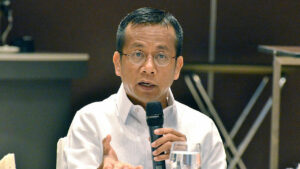A BRICS common currency is still a pipe dream

PAUL O’NEILL, a former US Treasury secretary, said that if America ever dropped the strong-dollar policy, he would hire a brass band at Yankee Stadium to mark the proclamation. O’Neill had reservations about the mantra, but ultimately fell into line. The musicians didn’t make it to rehearsal on his watch and Washington’s support for greenback primacy lived on, with the odd tweak every now and then.
Challenges to the dollar’s vital role in the world economic and financial system are often said to be, if not imminent, then over the horizon. But somehow they never quite materialize. Don’t expect any of the current noise about movement toward a currency shared by the BRICS nations — Brazil, Russia, India, China, and South Africa — to amount to much. If any of these were to be the foundation of a single unit of exchange, it would likely be China. Precedent isn’t encouraging: Seven years after the International Monetary Fund added the yuan to its basket of reserve currencies, it accounts for a very minute share of the global cache.
Nor should we be too impressed by the New Development Bank, a lender created by the quintet to become a counterweight to the IMF or World Bank, part of a journey by the Global South to some wonderland with minimal Western influence. Emerging markets chafe that an American gets to lead the World Bank and a European helms the IMF. The US is, after all, the biggest stakeholder in both.
Clickbait headlines aside, such initiatives say more about who is advancing them than the shortcomings of the greenback. Potshots that appeal to domestic audiences are no substitute for economic leadership. None of the pretenders appears remotely ready.
South Africa, the host of this week’s summit for BRICS leaders, has done its best in recent days to hose down some of the speculation about FX singularity. That’s a long way off, officials say. The talks will focus on issues including the establishment of a common payments system, South Africa’s envoy to the group said last week. What is likely is the formation of a technical committee to start considering a potential joint currency. This takes some of the heat out of the notion of a plot to dethrone the dollar.
Why did the idea get so far? It’s a distraction from difficulties faced by some of the five. Russia is isolated from respectable salons, and is raising interest rates to stem the ruble’s collapse while simultaneously financing its war against Ukraine. China’s economy is slackening after decades of meteoric growth. South African leaders are contending with their failure to live up to the early promise of the post-Apartheid years.
Among the ballyhooed threats to the dollar that petered out: the collapse of the gold standard, the advent of floating exchange rates, the US current account deficit, budget shortfalls, the global financial crisis, China’s dizzying rise after Deng Xiaoping’s reforms. The euro held some promise, but a sovereign debt crisis in the early 2010s stalled that ascent.
The metrics are familiar, yet compelling enough to repeat. The greenback comprises just under 60% of global currency reserves, according to the IMF. That’s down from around 70% in 2000, but still well above any competitor. The euro is next, with about 20%, followed by the yen and the British pound. The yuan has 2.6% of the total. In terms of trading, the dollar appears almost untouchable, accounting for one side of 88% of all transactions in the $7.5 trillion-a-day foreign-exchange market.
Emerging-market central bankers tend to get defensive on this subject. They are often asked about their intentions in the context of what the Federal Reserve is doing. They rightly insist that they don’t have to simply follow the Fed’s lead. But don’t miss the essential point: Their actions do reflect the broad trajectory of US rates, if not the precise timing. Moreover, these bankers are often drawn into a perspective on the Fed at their monthly press conferences and seem very well informed. I’m waiting for a similar dissertation on the People’s Bank of China.
Lesetja Kganyago, governor of the South African Reserve Bank, has correctly identified management of any currency as a definitive issue. Some monetary authority, somewhere, would have to call the shots. There was much horse trading about where the European Central Bank (ECB) would be headquartered, who would lead it and how would it be run. At the time, many leaders feared German dominance. The bank is headquartered in Frankfurt, but a German has yet to run the ECB. Two of its four presidents have been French.
For the BRICS, which don’t share the European Union’s sense of purpose in pursuing integration, the hurdles are legion. But will it be a no-show forever? As natural as the ECB and euro now look, the path was far from smooth and only really got a head of steam once the Berlin Wall came down and Germany reunited. Nor was the Fed always a sure thing. A central bank that resembled those in Europe was long anathema to large sections of the American political class. The idea of an institution dominated by Wall Street and East Coast business elites met fierce resistance from heartland populists, as Roger Lowenstein wrote in his 2015 book America’s Bank, which chronicled the creation of the Fed. Yet America needed a currency, and an institution backing it, that reflected the country’s growing commercial heft. Ultimately, it came together in 1913 as a messy compromise. Even today, differences arise between the district Fed banks and the Washington-based Board of Governors.
BRIC, the acronym devised in 2001 by Jim O’Neill, the former chief economist at Goldman Sachs, captured the mood of the time. China was going great guns after entry to the World Trade Organization. India’s ascent was underway after a financial crisis a decade earlier led to an opening up. Russian President Vladimir Putin was putting the economic collapse of the late 1990s behind him. The US slipped into recession, followed by a sluggish recovery, with confidence fragile after the Sept. 11 terrorist attacks. (South Africa was added to the group later.)
Too bad the countries themselves let it go to their heads.
BLOOMBERG OPINION




